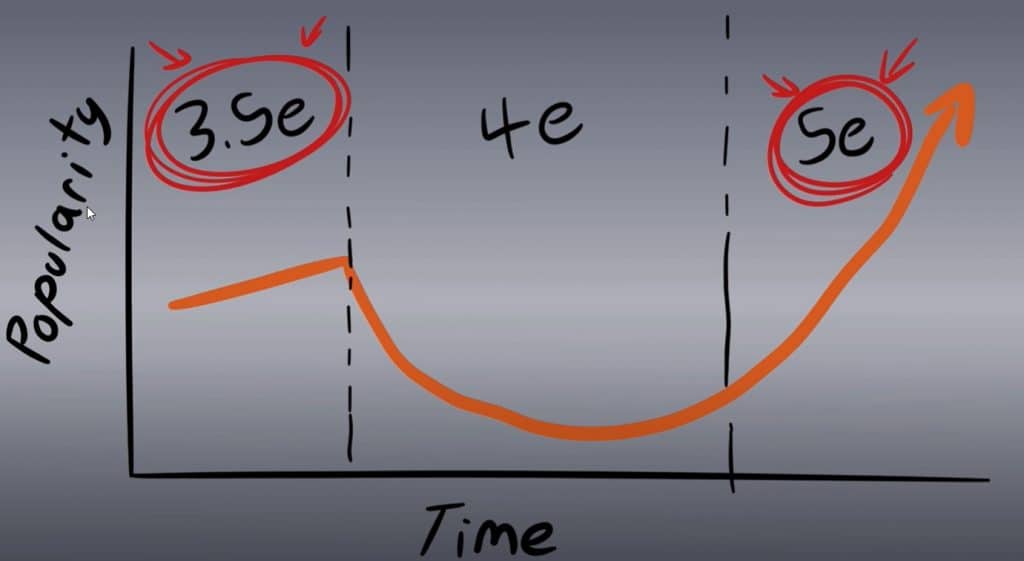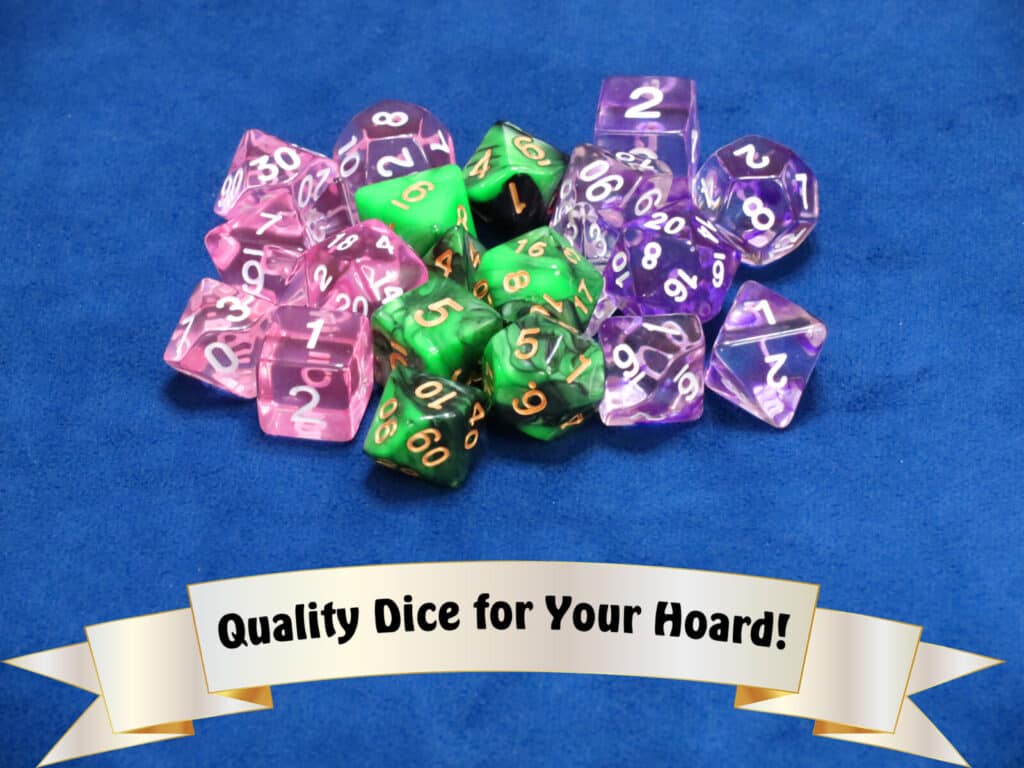Most questions like this are heavily opinion based and you will rarely get a general consensus. But when you talk with a large number of long-time Dungeons & Dragons players you will be surprised by just how many rush to pile onto the bandwagon of 4th edition being the worst of the modern editions of D&D.
While debates will rage, and are far from unanimous, among modern editions of Dungeons & Dragons (D&D) the strong consensus among most players and game masters seems to be that 4th edition was the worst edition of DnD.
In fairness there are those who defend 4th edition and the occasional soul who will adamantly defend it as their favorite of all the editions, and we will spend a little bit of time on their counterpoints at the end.

General Consensus Worst D&D Edition: 4th Edition
There is a huge group of fans who absolutely love 3.5. This is basically 3rd edition, but with major updates that “filled out” third edition and basically more or less completed it, listened to player wants for the base 3E system. So it’s referred to as 3.5 even though it’s more or less the complete 3rd.
There’s also a large group who really likes 5th edition, and admittedly I’m in this group. A heavy focus on story, good guidelines, but also a heavy emphasis on being able to home rule or DM intervene means this is a very flexible system which, as a GM, I really like. Same as a player, though criticisms of 5E saying it needs more magic items, more support books, and more adventures are all valid and on point.
Volo’s, Xanathar’s, and Tasha’s is doing a really good job of filling out the game via player complaints and suggestions one piece at a time…but the rate of how quickly they are released should definitely be increased.
The group that really loves 4th Ed is there…but it’s much smaller. In fact, as I was first getting introduced to D&D (disclaimer: I was introduced to D&D via 5th Ed but have played many, many different editions and/or systems in the years since) I was surprised that everyone was talking about 3.5 vs. 5.
So what happened to Four?
We don’t count Four, was a response I received as if this was an obvious statement. Sometimes followed up by the idea that it was so bad an entirely new and competing RPG system, Pathfinder, was a direct result of how badly 4th Ed fell short.
So where did Fourth Edition go wrong? Why is Fourth Edition D&D considered the worst edition of the modern editions?
There are a few reasons that seem to come up quite a bit. The first being starting off on the wrong foot with old players. There were a massive number of 3rd edition and 3.5 edition books out there. Braden has dozens upon dozens of them himself. The announcement of a sudden movement to 4th edition was a bit of a surprise, and it threw off many old school players who loved 3rd edition and only wanted to see some minor improvements.
Part of the reason the new edition was a surprise was it made 3/3.5 the shortest run of the various D&D editions which after releasing so many books didn’t go over very well. Especially considering there was no “conversion” assistance.
Fourth edition was so different that it was impossible to port stats from an on-going 3rd Ed campaign to 4th Ed. It just wasn’t viable.
A second reason 4th Ed has a bad reputation is because it’s so different from other editions. This isn’t necessarily a bad thing but one comment was that 4th Ed was basically a minis wargame. It was War Hammer or it was a tabletop version of World of Warcraft. To many players it didn’t feel like D&D.
This wasn’t a bad system but to many players it didn’t feel like D&D.
Which brings us to probably the biggest complaint with 4th edition Dungeons & Dragons: The combat was a level of super grind that has never been met since. Stories about of how it took 5 hours to kill 4 kobolds, or 6 hours to get through one round of combat with human enemies. There were so many modifiers going into any particular situation that it could quickly just get out of control.
As many stories I’ve heard have attested to, and as some of the videos down below also hit on, this took away from the role playing, it made combat long, grindy, and hard to move through, and many characters felt railroaded into choices that took away the agency that makes D&D and many other systems so great.
Because of that combination of reasons, as good as many advancements in 4E were (and there was a lot of good stuff that came out of the experimenting with this system) it was a solid dud with many players. To the point the majority stayed with 3.5 or broke off with Pathfinder.
Which is why 4th edition is widely considered the worst modern edition of Dungeons & Dragons.
This isn’t an isolated opinion as you can see from:
- Puffin Forest D&D “4E Was A Game”
- Lindybeige Minces no words on how bad 4E combat is
- Part 2 of in-depth thoughts on the 4th Ed D&D system
- Not a straight out review, but related video of “What happened with 4th Edition?”
One player I talked to compared 4th edition to another pop culture stumble: the seasons where The Simpsons felt like they had to compete more with Family Guy which led to the worst and most forgettable seasons (those in the mid to late teens).
Another perspective I found interesting was the idea that “It was a good system for what it was, but it never felt like D&D.” I actually feel that way about the Star Trek reboots.
Whatever the reasons, there is no other system that seems to bring in the passionate anger against a system as 4E does and while defenders of it are out there – you kind of have to look for them.
The picture below is from Puffin Forest, an AMAZING D&D YouTube channel that you should follow. Picture is from his 4th Edition Memory video which you can find HERE, as well.

Is the 4E Criticism Not Fair?
In fairness, there are a lot of good things with 4th edition. There are good things with all the editions, and more than one apologist for 4th Ed D&D will point out that many mechanics 5E players like came from 4th and were renamed or tweaked and renamed. Fair point.
Even when looking at say, 5E, many people use minor house rules or are using altered rules that would work as house rules and they don’t even know it. If those things make the system run smoother than is 5E that much better than 4E, or is it only when customizing it that things work smoothly?
This is fair. That being said, 5E is very much designed to allow for DMs to have a lot of leeway to run the campaign or story that they want to run. Many felt the rigid structure of 4E had such a railroad effect that you really didn’t have many places where you had any agency even as the game master to do this without just making the rules up wholesale.
Which for most of us doesn’t sound like a lot of fun.
That said, bringing in the grid system to combat, things like flanking and contested movement, as well as other features have overall definitely been good for the direction of 5E, which many see as having done a great job of borrowing heavily from what worked form 3.5 and 4 while leaving a lot behind. The low magic setting and the large areas around magic and crafting that needed to be filled in were a bit baffling, but those are topics for another time.
The positive points in four can’t salvage it from being seen as the worst modern edition of D&D, but making this a complete dump fest wouldn’t be completely fair either. But that, also, is a topic for another day.
In fairness there are counterpoints from some players/DMs who actually liked 4th edition quite a bit, and even more than 5E. While this tends to be heavily in the minority, it’s always good to get the other point of view on the topic:
- In defense of 4th Edition
- Why I like 4th Edition more than 5th Edition
- Nerdarchy: Differing views & in-depth look at 4th Ed
A Note on Very Early Editions
There’s a reason why 1st Ed, 2nd Ed, and the pre-official editions aren’t in here. In the same way you can’t compare an Atari or original Nintendo game to a new release on Steam or the PS4, there has been over 40 years of changes, growth, and evolution in what makes a good system. In a “no history or background” situation clearly the very earliest eds wouldn’t hold up to modern ones.
But they laid the foundation for everything that was to follow.
So comparing them, not really fair. But recognizing their importance and starting with 3 which was the first sort of “modern” tie together of all the lessons from earlier games and editions, that’s fair.
Other DnD Articles You May Like
- How long should a DnD session last
- Barbarian vs. Fighter 5th Ed DnD
- Underrated Utility Spells 5th Ed DnD
- Wizard Vs. Sorcerer 5E
- Component Pouch Vs. Arcane Focus 5th Ed

Proud to embrace the locally created moniker of “Corrupt Overlord” from one of the all time great Lords of Waterdeep runs, Shane is one member of the Assorted Meeples crew and will be hard at work creating awesome content for the website. He is a long-time player of board games, one time semi-professional poker player, and tends to run to the quirky or RPG side of things when it comes to playing video games. He loves tabletop roleplaying systems like Dungeons & Dragons, Pathfinder, Werewolf, Fate, and others, and not only has been a player but has run games as DM for years. You can find his other work in publications like Level Skip or Hobby Lark.


